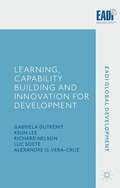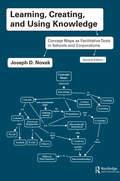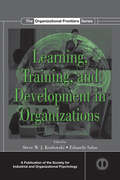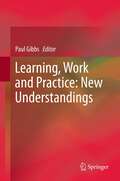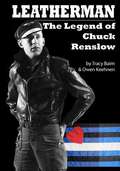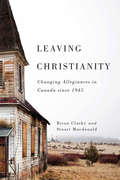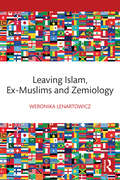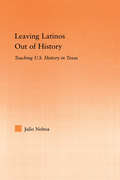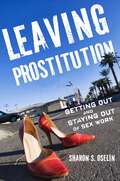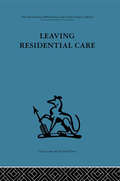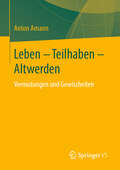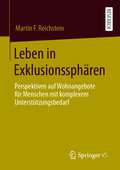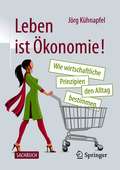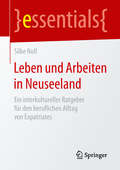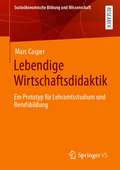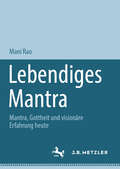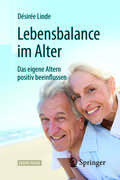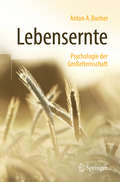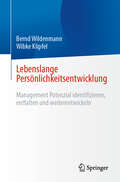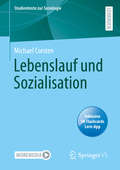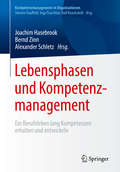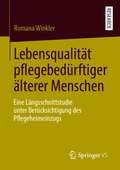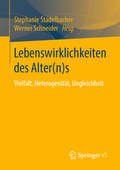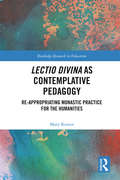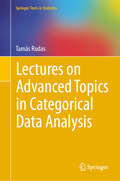- Table View
- List View
Learning, Capability Building and Innovation
by Keun Lee Richard Nelson Gabriela Dutr�nit Alexandre O. Vera-Cruz Luc SoeteToday, a large number of scholars studying development understand this process as involving learning and capability building. Capability building is an active, not a passive, process. It requires a purposeful effort from the learner's side, with support and commitment on allocation of time and resources toward learning activities. This process implies the possibility of failure as well as success, as we also learn from failures. A global cast of academics and policy makers examines economic development as a process of learning and technological accumulation, showing how economic development is a process involving creative destruction. While markets and market competition play major roles in structuring the development process, non-market institutions and government policies matter.
Learning, Creating, and Using Knowledge: Concept Maps as Facilitative Tools in Schools and Corporations
by Joseph D. NovakThis fully revised and updated edition of Learning, Creating, and Using Knowledge recognizes that the future of economic well being in today's knowledge and information society rests upon the effectiveness of schools and corporations to empower their people to be more effective learners and knowledge creators. Novak’s pioneering theory of education presented in the first edition remains viable and useful. This new edition updates his theory for meaningful learning and autonomous knowledge building along with tools to make it operational ─ that is, concept maps, created with the use of CMapTools and the V diagram. The theory is easy to put into practice, since it includes resources to facilitate the process, especially concept maps, now optimised by CMapTools software. CMapTools software is highly intuitive and easy to use. People who have until now been reluctant to use the new technologies in their professional lives are will find this book particularly helpful. Learning, Creating, and Using Knowledge is essential reading for educators at all levels and corporate managers who seek to enhance worker productivity.
Learning, Training, and Development in Organizations (SIOP Organizational Frontiers Series)
by Steve W. J. KozlowskiThis scholarly book in SIOP’s Organizational Frontier series looks at research on enhancing knowledge acquisition and its application in organizations. It concentrates on training, design and delivery given the changing nature of work and organizations. Now that work is increasingly complex, there is greater emphasis on expertise and cognitive skills. Advances in technology such as computer simulations and web-based training are necessitating a more active role for the learner in the training process. In the broad context of the organization systems, this book promotes learning and development as a continuous lifelong endeavor.
Learning, Work and Practice: New Understandings
by Paul GibbsThis book's original contribution to a crowded literature on work and learning will attract strong international interest. Its focus on the philosophy of learning at work brings a fresh perspective on a topic normally viewed through psychological, anthropological and sociological eyes. It assembles a host of internationally recognized scholars who reflect on the various philosophies of work-based learning. Full of distinctive and original contributions that provide perceptive insights into the subject, the work will be a practical support to teachers, trainers and researchers at the same time as it gives readers a clear philosophical grounding in learning at work. It is, however, not simply a book about philosophy, but a gazetteer of approaches to education in work that will sustain and inspire those who provide, engage in, and support the learning of new knowledge and skills in the workplace. With adaptability to new employment opportunities so vital to existing workers, the authors stand behind continued provision of work-based learning in the face of tightening economic constraints.
Leatherman: The Legend of Chuck Renslow
by Tracy Baim Owen KeehnenA prominent Chicago gay activist and entrepreneur is the subject of an in-depth biography, Leatherman: The Legend of Chuck Renslow, by journalists and authors Tracy Baim and Owen Keehnen. Living as an openly gay man in 1950s Chicago was no easy task. For Chuck Renslow, that was only his first of many bold moves. Just out of high school he began what was to become a six-decade empire, starting more than two dozen businesses in Chicago, as well as a few in other cities. He has owned bars, discos, photo studios, health clubs, bathhouses, gay magazines and newspapers, hotels, restaurants, and bookstores. Throughout it all he dealt with Mafia and police payoffs, anti-gay political policies, harassment from censors, and even controversy within the gay community. In the mid-1950s, after having a portrait and then cheesecake studio, Renslow began experimenting with beefcake photography and began Kris Studio. With his longtime lover, the artist Dom Orejudos aka Etienne and Stephen, at his side, Renslow created Kris Studio a leader in male physique photography, resulting in such magazines as Triumph, Mars and The Rawhide Male, producing thousands of erotic images as well as several films. In 1959 Renslow took over the Gold Coast Show Lounge and transformed it into one of the most lowdown libidinous gay leather bars in the world. With Etienne's murals adorning the walls, a leather/Western/uniform dress code for patrons, and a dark Pit that featured all sorts of goings-on, the Gold Coast set the standard for raunchy kink and gay sexual liberation. It was the birthplace of motorcycle clubs and sex groups, but above all a place for people to meet, connect, and explore themselves and their sexuality. The Gold Coast was also the birthplace of the first leather contest, which in the span of a few short years evolved beyond the bar's capacity and became International Mr. Leather in 1979. More than three decades later, it continues to be one of the world's most popular gay events. Renslow was also one of the pioneers in taking a bathhouse beyond merely the borders of a mere sex club. Man's Country became something truly unforgettable in the 1970s - a sex-and-entertainment complex with a variety of rooms, shops, and a Music Hall that attracted top names touring in the "K-Y circuit," from Sally Rand to Wayland Flowers to Rusty Warren and Charles Pierce. Renslow was a dynamic force in Chicago politics under mayors starting with Richard J. Daley, and he ran to be a delegate for Sen. Ted Kennedy's 1980 presidential run. He danced with another man at a 1977 inaugural ball for Jimmy Carter. Renslow helped protest against unfair policies, fought censorship and entrapment, and battled Anita Bryant. He even served as a field contact for the pioneering work at the Kinsey Institute, as well as performing sexual acts for Kinsey researchers. He knew entertainment celebrities from Marlene Dietrich to Rudolf Nureyev, from Divine to Grace Jones, and from Sylvester to Quentin Crisp. In their heyday Chuck Renslow's annual White Parties were celebrations beyond compare. When Chicago's gay community faced the loss of its newspaper, Renslow bailed out and ran GayLife. He also co-founded the Leather Archives & Museum (with Tony DeBlase). Through it all Renslow has also been Daddy of the Family, a unique created group of lovers, tricks, and friends who were bound by sex and oftentimes love and by a goal of providing comfort and support to one another.
Leaving Christianity: Changing Allegiances in Canada since 1945 (Advancing Studies in Religion)
by Stuart Macdonald Brian P. ClarkeCanadians were once church-goers. During the post-war boom of the 1950s, Canadian churches were vibrant institutions, with attendance rates even higher than in the United States, but the following decade witnessed emptying pews. What happened? In Leaving Christianity Brian Clarke and Stuart Macdonald quantitatively map the nature and extent of Canadians’ disengagement with organized religion and assess the implications for Canadian society and its religious institutions. Drawing on a wide array of national and denominational statistics, they illustrate how the exodus that began with disaffected baby boomers and their parents has become so widespread that religiously unaffiliated Canadians are now the new majority. While the old mainstream Protestant churches have been the hardest hit, the Roman Catholic Church has also experienced a significant decline in numbers, especially in Quebec. Canada’s civil society has historically depended on church members for support, and a massive drift away from churches has profound implications for its future. Leaving Christianity documents the true extent of the decline, the timing of it, and the reasons for this major cultural shift.
Leaving Islam, Ex-Muslims and Zemiology
by Weronika LenartowiczCases of ex-Muslims in Europe being punished by their former fellow Muslims constitute an unacceptable practice from the standpoint of democratic societies in which human rights are respected and individuals have the freedom to choose their religion, or none at all. Ex-Muslims’ fear of punishment by their former community should prompt an open, candid, and measured discussion of the issue.Leaving Islam, Ex-Muslims and Zemiology presents the reasons for and consequences of consciously leaving Islam, based on interviews with 80 ex-Muslims currently living in Germany and Sweden. In their view, many of the practices and beliefs of Islam are harmful and unfair. Many parts of the Islamic world regard apostasy as treason or a crime. As a result, emphasis in the book is shifted from “crime” to “harm” and a thesis is put forward concerning the “decriminalization” of apostasy from the perspective of zemiology. The book highlights how a broader shift of interest in the democratic structures of Europe could allow ex-Muslims to join the discussion on the guaranteed right to religious liberties and freedom of speech in the context of the apostasy law in Islam. This should happen without fear for their own security and without facing potential suppression or social exclusion. It will appeal to scholars with interest in Islam and the conflict between religious values and an individual’s aspirations and needs.
Leaving Latinos Out of History: Teaching US History in Texas
by Julio NoboaDespite being the state with perhaps the longest history of Latino presence, power and influence, Texas has very much under-represented Latinos in its schools history curriculum. Through an analysis of teaching materials and curriculum goals, Noboa investigates the extent to which this significant minority is effectively excluded from American historical narrative.
Leaving Prostitution: Getting Out and Staying Out of Sex Work
by Sharon S. OselinWhile street prostitutes comprise only a small minority of sex workers, they have the highest rates of physicaland sexual abuse, arrest and incarceration, drug addiction, and stigmatization, which stem from both their public visibility and their dangerous work settings. Exiting the trade can be a daunting task for street prostitutes; despite this, many do try at some point to leave sex work behind. Focusing on four differentorganizations based in Chicago, Minneapolis, Los Angeles, and Hartford that help prostitutes get off the streets, Sharon S. Oselin’s Leaving Prostitution explores the difficulties, rewards, and public responses tofemale street prostitutes’ transition out of sex work.Through in-depth interviews and field research with street-level sex workers, Oselin illuminates their pathways into the trade and their experiences while in it, and the host of organizational, social, and individual factors that influence whether they are able to stop working as prostitutes altogether. She also speaks to staff atorganizations that aid street prostitutes, and assesses the techniques they use to help these women develop self-esteem, healthy relationships with family and community, and workplace skills. Oselin paints a full picture of the difficulties these women face in moving away from sex work and the approaches that do and do not work to help them transform their lives. Further, she offers recommendations to help improve the quality of life for these women. A powerful ethnographic account, Leaving Prostitution provides an essential understanding of getting out and staying out of sex work.
Leaving Residential Care (Residential Social Work Ser.)
by Gwyneth Roberts Paul Brearley Penny Gutridge Jim Black Elizabeth TarranTavistock Press was established as a co-operative venture between the Tavistock Institute and Routledge & Kegan Paul (RKP) in the 1950s to produce a series of major contributions across the social sciences. This volume is part of a 2001 reissue of a selection of those important works which have since gone out of print, or are difficult to locate. Published by Routledge, 112 volumes in total are being brought together under the name The International Behavioural and Social Sciences Library: Classics from the Tavistock Press. Reproduced here in facsimile, this volume was originally published in 1982 and is available individually. The collection is also available in a number of themed mini-sets of between 5 and 13 volumes, or as a complete collection.
Leben - Teilhaben - Altwerden: Vermutungen und Gewissheiten
by Anton AmannLeben muss als Ergebnis der Evolution aufgefasst werden und menschliches Leben als die Entstehung der Art Sapiens aus der Gattung des Homo aus der Familie der Menschenaffen. Wird die Entstehung menschlichen Lebens als evolutionäre Tatsache mit der Vorstellung sozialen Lebens gekoppelt, werden wir auf die konstruktive Hervorbringung der menschlichen Lebensformen verwiesen, deren integraler Bestandteil gesellschaflichte Teilhabe ist. Teilhabe ist einerseits an die Phylogenese der Art Sapiens rückgebunden, muss andererseits aber von jedem Menschen in der Ontogenese neu erworben und praktiziert werden, wobei er auf Umwelt angewiesen ist. Teilhabe im Alter ist eine eigene Spezifikation der Bedingungen dieses Prozesses und lässt sich anhand einer Vielzahl von empirischen Befunden darstellen.
Leben in Exklusionssphären: Perspektiven auf Wohnangebote für Menschen mit komplexem Unterstützungsbedarf
by Martin F. ReichsteinIm Bereich wohnbezogener Hilfen für Menschen mit sogenannter geistiger Behinderung treten systemisch und systematisch ,Exklusionssphären‘ in Form von hochspezialisierten Angeboten sowie ,Resteinrichtungen‘ auf. Hiervon sind aktuell Menschen mit komplexen Unterstützungsbedarfen besonders betroffen. Der Autor untersucht am Beispiel von Menschen mit sogenannter geistiger Behinderung und herausforderndem Verhalten, schwerer bzw. mehrfacher Beeinträchtigung sowie fortgeschrittenem bzw. hohem Lebensalter explorativ das Entstehen von ,Exklusionssphären‘ sowie deren Auswirkungen auf die individuelle Lebensqualität und die persönlichen Sozialräume betroffener Personen.
Leben ist Ökonomie!: Wie wirtschaftliche Prinzipien den Alltag bestimmen
by Jörg Kühnapfel„Immer dreht sich alles nur ums Geld!“ Ökonomie wird gemeinhin als Gegenpol zu Emotionen begriffen, als eine Welt voller Zwänge und Notwendigkeiten. Der Begriff "Ökonomie" ist weithin negativ konnotiert und gilt als unsympathisch; er hat zweifellos ein Imageproblem. Doch das gesamte Lebensumfeld ist ein ökonomisch determiniertes System im Sinne von Chancen und Risiken, Einsatz und Ergebnis. Dieses Buch vermittelt beispielhaft anhand typischer Momente im Tagesverlauf der Protagonistin Julia die Erkenntnis, dass sich jeder Mensch unentwegt in einem Universum ökonomischer Modelle bewegt und mithilfe wirtschaftlicher Erwägungen seine Alltags- und Lebensentscheidungen deutlich verbessern kann - zu eigenen wie zu anderer Gunsten.
Leben und Arbeiten in Neuseeland: Ein interkultureller Ratgeber für den beruflichen Alltag von Expatriates (essentials)
by Silke NollDieses essential beschreibt Schritt für Schritt Jobsuche, Berufseinstieg, beruflichen Alltag und angrenzende Privatbereiche in Neuseeland und damit verbundene potenzielle Stolpersteine bei der interkulturellen Kommunikation. Das Buch geht sowohl auf oberflächlich Offensichtliches ein, als auch auf subtilere Wahrnehmungen, die durch die interkulturelle Theorie erklärt werden. Der Leser erhält auf diese Weise ein tieferes Verständnis der neuseeländischen Kultur mit ihren Werten und ungeschriebenen Regeln und Gesetzen. Und damit eine Chance, den Einstieg in dem Land am anderen Ende der Welt noch erfolgreicher zu gestalten.
Lebendige Wirtschaftsdidaktik: Ein Prototyp für Lehramtsstudium und Berufsbildung (Sozioökonomische Bildung und Wissenschaft)
by Marc CasperWoran liegt es, wenn sich Wirtschaft tot(-langweilig) anfühlt? Wie kann Wirtschaft für Lernende „lebendig“ werden? Mehr als eine Metapher, so lässt sich die Idee des „Lebendigen Lernens“ nach Cohn für didaktische Analyse und Gestaltung ausdifferenzieren. Diese Arbeit erschließt dazu Konzepte der Kritischen Theorie und der Humanistischen Psychologie für die Wirtschaftsdidaktik. Exemplarisch steht eine universitäre Lehrveranstaltung im Lehramt an Beruflichen Schulen im Mittelpunkt, aus der im Modus gestaltungsorientierter Forschung die hier vorgestellten Gestaltungskriterien gewonnen wurden.
Lebendiges Mantra: Mantra, Gottheit und visionäre Erfahrung heute
by Mani RaoLiving Mantra ist eine Anthropologie der Mantra-Erfahrung unter hinduistisch-tantrischen Praktizierenden. In alten indischen Lehren und Legenden rufen Mantras, die von Rishis (Sehern) wahrgenommen werden, Gottheiten an und haben transformative Kräfte. Mit einer Methodik, die Wissenschaft und Praxis verbindet, entdeckt Mani Rao eine fortdauernde Tradition von Visionären (Rishis/Sehern) und Offenbarungen im südindischen Bundesstaat Andhra-Telangana. Das tiefgründig recherchierte und mit faszinierenden Erzählungen gespickte Buch formuliert die Poetik der Mantra-Praxis neu, während es gleichzeitig praktische Fragen erforscht. Kann man wissen, ob eine Vision real oder eingebildet ist? Ist eine Vision visuell? Werden Gottheitsvisionen durch die Kultur vermittelt? Wenn Mantras wirksam sind, welche Rolle spielt dann die Hingabe? Sind Mantras Sprache? Living Mantra stellt nicht nur theoretische Fragen, sondern auch solche, die sich ein Praktizierender stellen würde: Wie wählt man zumBeispiel eine Gottheit aus oder was bindet einen an einen Guru? Rao betritt Neuland, indem er die Aufmerksamkeit auf die Momente lenkt, die der Systematisierung und Kanonbildung vorausgehen, und zeigt, wie autoritative Quellen entstehen.
Lebensbalance im Alter
by Stephan Meyer Désirée LindeDieses Buch hilft Ihnen bei der Vorbereitung und erfolgreichen Gestaltung des Ruhestands. Ausgehend von der Erarbeitung eines eigenen, positiven Altersselbstbildes erhalten Sie als Leser eine Anleitung, wie Sie durch neue Selbsterkenntnisse und einen fürsorglicheren Umgang mit sich selbst ein erfülltes und glücklicheres Altern erleben. Auch dient es zur Prävention von Altersschwermut.In diesem praxisrelevanten Ratgeber erfahren Sie alles Wichtige für die praktische Umsetzung von Wissen zum Verhalten. Dabei geht es um folgende Lebensbereiche: Körper und Geist, soziale Beziehungen, Arbeit und Freizeit, sowie Freude und Sinn des Lebens, auch für Kranke.Um die individuellen Möglichkeiten, gute Vorsätze und Absichten Wirklichkeit werden zu lassen, bietet jedes Kapitel Raum zur eigenen Reflexion. Außerdem schließt das Buch den Umgang mit Trauer und die Vorbereitung des eigenen irdischen Lebensendes mit ein.Die Themen des Buches sind von besonderer Bedeutung für Menschen, die sich aktiv auf ihren Ruhestand vorbereiten wollen, sowie für solche, die bereits im Ruhestand sind und ihre Möglichkeiten überdenken und ihre Verhaltenskompetenz erweitern möchten. Es möchte dem Leser helfen, am eigenen Selbstbild zu arbeiten und die vorhandenen individuellen Möglichkeiten auszuschöpfen. Das Buch ist auch für diejenigen geeignet, die mit alten Menschen arbeiten. Der Text erfordert keine Fachkenntnisse und ist durch viele authentische Beispiele leicht lesbar.
Lebensernte: Psychologie der Großelternschaft
by Anton A. BucherIn diesem Buch können sich alle, die in ihre Enkel vernarrt sind, informieren, warum sie damit sehr richtig liegen. Ein Streifzug durch Geschichte und Literatur wird fundiert durch Aspekte der Familienforschung und die soziologische Betrachtung einer neuen Rolle der Großeltern. Heute haben Großeltern nicht mehr nur eine Funktion für die Kleinen, sondern begleiten über die Lebensspanne. In einer Zeit, in der man den Eindruck bekommt, jeder Zweite würde das Alter als Last empfinden oder jeder Vierte lebe in Zwist und Trennung, lädt der Autor ein, die Etappe als Oma und Opa als Ressource für ein gelungenes Leben zwischen Individuation und Bezogenheit zu entdecken – für sich selbst wie für die Enkel. Die Sicht der Enkel rundet das Lesebuch ab. Aus dem Inhalt: Großeltern in Literatur und Geschichte – Nicht nur Märchen erzählen, sondern joggen gehen – Ernte der Beziehung – Die Sicht der Enkel. Über den Autor: Prof. Dr. Anton A. Bucher widmet sich neben seinen universitären Studien gern psychologischen Aspekten des guten Lebens und ist Autor mehrerer erfolgreicher Bücher.
Lebenslange Persönlichkeitsentwicklung: Management Potenzial identifizieren, entfalten und weiterentwickeln
by Bernd Wildenmann Wibke KlipfelDieses Buch unterstützt Sie dabei, den eigenen Stand der Persönlichkeitsreifung zu ermitteln und weiterzuentwickeln. Dies wird Ihnen auch in der Führung und Begleitung anderer Menschen weiterhelfen. Aus der Erkenntnis der lebenslangen Entwicklung der Persönlichkeit, ergeben sich im Laufe des Lebens in den verschiedenen Reifungsstufen viele Möglichkeiten der Entfaltung. Das Buch zeigt auf, dass zwar nicht alles zu jedem Zeitpunkt, aber zu jedem Zeitpunkt etwas entwickelbar ist. Anhand eines leicht verständlich dargestellten Modells erfahren Sie, welche Reifestufen wir Menschen erreichen können und welche persönlichen Entwicklungen über das Leben hinweg möglich sind. Dabei wird das übliche horizontale Einschätzungsverfahren mit Kompetenzen, Haltungen, Motiven und Emotionen durch eine vertikale, neue und spannende Perspektive ergänzt. Sie erhalten Entwicklungstipps für die unterschiedlichen Entwicklungsstufen und Entwicklungsfelder. Die Autoren vermitteln dabei positive Entwicklungsmöglichkeiten in nahezu allen Feldern und regen damit einen Paradigmenwechsel der Persönlichkeitsbetrachtung an.
Lebenslauf und Sozialisation (Studientexte zur Soziologie)
by Michael CorstenDieses Lehrbuch ist eine Einladung, sich aus soziologischer Perspektive mit den Themen des Lebenslaufs und der Sozialisation auseinanderzusetzen. Es zeigt die inhaltlichen und methodischen Bezüge zwischen Lebenslauf- und Sozialisationsforschung. Lebenslauf und Sozialisation werden untersucht, um die Einflüsse der Gesellschaft auf individuelle Entwicklungs- und Bildungsprozesse zu rekonstruieren. Diese erfahrungswissenschaftliche Perspektive auf Lebenslauf und Sozialisation begann im 20. Jahrhundert in den USA und etablierte sich als Forschungsrichtung in der Soziologie weltweit.Zusätzliche Fragen per App: Laden Sie die Springer Nature Flashcards-App kostenlos herunter und nutzen Sie exklusives Zusatzmaterial, um Ihr Wissen zu prüfen.
Lebensphasen und Kompetenzmanagement
by Joachim Hasebrook Bernd Zinn Alexander SchletzKompetenzen älterer Mitarbeiterinnen und Mitarbeiter werden im Betrieb gehalten, jüngere Mitarbeiter profitieren von den Erfahrungen älterer, Familiengründung, finanzielle Absicherung und berufliche Karriere werden für beide Elternteile unter einen Hut gebracht: Dies alles und mehr sind Aufgaben einer an Lebensphasen und -ereignissen ausgerichteten Kompetenzentwicklung, um die es in diesem Band gehen soll. Dieses Buch vermittelt fundiert und praxisnah, wie sich organisationales Kompetenzmanagement in Zeiten des demografischen Wandels an Lebensphasen und -ereignissen orientieren kann.
Lebensqualität pflegebedürftiger älterer Menschen: Eine Längsschnittstudie unter Berücksichtigung des Pflegeheimeinzugs
by Romana WinklerRomana Winkler untersucht den Einfluss des Pflegeheimeinzugs sowie ausgewählter Aspekte sozialer Ungleichheit auf die Lebensqualität pflege- und betreuungsbedürftiger älterer Menschen in Österreich. Dies erfolgt durch eine Längsschnittstudie beim Einzug in das Pflegeheim sowie eine und zwölf Wochen danach, und zwar durch eine Mehrebenenanalyse, die strukturelle Unterschiede zwischen Pflegeheimen mitberücksichtigt. Detailliert analysiert die Autorin Einflussfaktoren auf die Gesamt-Lebensqualität und Teilbereiche sowie Gründe für eine Verbesserung bzw. Verschlechterung. Sie liefert Anregungen für weitere Forschungsaktivitäten und konkrete Handlungsempfehlungen für die Praxis.
Lebenswirklichkeiten des Alter(n)s: Vielfalt, Heterogenität, Ungleichheit
by Werner Schneider Stephanie StadelbacherAlter(n) ist eine gesellschaftliche Konstruktion, die sich abhängig von soziokulturellen und sozialstrukturellen Rahmenbedingungen auf der einen Seite und lebensweltlichen Bezügen, Interaktions- und Beziehungssystemen auf der anderen Seite realisiert. Im Sammelband soll ein Blick in die verschiedenen Lebenswelten der Älterwerdenden und Alten im Sinne von gesellschaftlich gerahmten, sozial gestalteten und subjektiv wahrgenommenen Wirklichkeiten des Alter(n)s in unserer Gesellschaft geworfen werden. Als relevante lebensweltliche Bereiche werden hier Gesundheit, Arbeit (und Freizeit), Wohnen, Familie/soziale Beziehungen, Sozialraum, soziales Engagement bis hin zu Pflege und Lebensende betrachtet. In den Beiträgen sollen Gegenwartsanalysen und mögliche Zukunftsszenarien zum Älterwerden und Altsein in unserer Gesellschaft skizziert werden.
Lectio Divina as Contemplative Pedagogy: Re-appropriating Monastic Practice for the Humanities (Routledge Research in Education #16)
by Mary KeatorOffering an original application of the ancient monastic practice of lectio divina to the humanities, this book demonstrates the need for further emphasis on deep reading, reflection, and contemplation in contemporary university classrooms. Each chapter provides readers with an historical overview of the four movements of this monastic method: lectio (reading), meditatio (interpreting), oratio (responding), and contemplatio (experiencing wisdom), and suggests ways to incorporate these practices in humanites courses. Keator demonstrates that the lectio divina method is a viable pedagogical tool to guide students slowly and methodically through literary texts and into a subjective experience of wisdom and meaning.
Lectures on Advanced Topics in Categorical Data Analysis (Springer Texts in Statistics)
by Tamás RudasThis book continues the mission of the previous text by the author, Lectures on Categorical Data Analysis, by expanding on the introductory concepts from that volume and providing a mathematically rigorous presentation of advanced topics and current research in statistical techniques which can be applied in the social, political, behavioral, and life sciences. It presents an intuitive and unified discussion of an array of themes in categorical data analysis, and the emphasis on structure over stochastics renders many of the methods applicable in machine learning environments and for the analysis of big data. The book focuses on graphical models, their application in causal analysis, the analytical properties of parameterizations of multivariate discrete distributions, marginal models, and coordinate-free relational models. To guide the readers in future research, the volume provides references to original papers and also offers detailed proofs of most of the significant results. Like the previous volume, it features exercises and research questions, making it appropriate for graduate students, as well as for active researchers.
